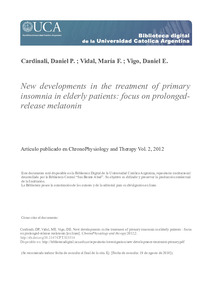Por favor, use este identificador para citar o enlazar este ítem:
https://repositorio.uca.edu.ar/handle/123456789/1651| Título: | New developments in the treatment of primary insomnia in elderly patients : focus on prolonged-release melatonin | Autor: | Cardinali, Daniel Pedro Vidal, María Florencia Vigo, Daniel Eduardo |
Palabras clave: | INSOMNIO; MELATONINA; ENSAYO CLINICO; RITMO CIRCADIANO | Fecha de publicación: | 2012 | Editorial: | Dove Medical Press | Cita: | Cardinali, D. P., Vidal, M. F., Vigo, D. E. New developments in the treatment of primary insomnia in elderly patients : focus on prolonged-release melatonin [en línea]. ChronoPhysiology and Therapy. 2012, 2. doi:10.2147/CPT.S15514. Disponible en: https://repositorio.uca.edu.ar/handle/123456789/1651 | Resumen: | Abstract: A temporal relationship between the nocturnal rise in melatonin secretion and the increase in sleep propensity at the beginning of the night, coupled with the sleep-promoting effects of exogenous melatonin, indicate that melatonin is involved in the regulation of sleep. This action is attributed to the MT1 and MT2 melatonin receptors present in the hypothalamic suprachiasmatic nucleus and other brain areas. The sleep-promoting actions of melatonin, which are demonstrable in healthy humans, have been found to be useful in subjects suffering from circadian rhythm sleep disorders and in elderly patients, who had low nocturnal melatonin production and secretion. The effectiveness of melatonin in treating sleep disturbances in these patients is relevant because the sleep-promoting compounds that are usually prescribed, such as benzodiazepines and related drugs, have many adverse effects, such as next-day hangover, dependence, and impairment of memory. Melatonin has been used for improving sleep in patients with insomnia mainly because it does not cause any hangover or show any addictive potential. However, there is a lack of consistency concerning its therapeutic value (partly because of its short half-life and the small quantities of melatonin used). Thus, attention has been focused either on the development of more potent melatonin analogs with prolonged effects or on the design of slow-release melatonin preparations. A prolonged-release preparation of melatonin 2 mg (Circadin®) has been approved for the treatment of primary insomnia in patients aged $55 years in the European Union. This prolonged-release preparation of melatonin had no effect on psychomotor functions, memory recall, or driving skills during the night or the next morning relative to placebo, and was associated with significantly less impairment on many of these tasks relative to zolpidem alone or in combination with prolonged-release melatonin. In 3-week and 6-month randomized, double-blind, clinical trials in patients with primary insomnia aged $55 years, prolonged-release melatonin was associated with improvements relative to placebo in many sleep and daytime parameters, including sleep quality and latency, morning alertness, and quality of life. Prolonged-release melatonin was very well tolerated in clinical trials in older patients, with a tolerability profile similar to that of placebo. Short-term or longerterm treatment with prolonged-release melatonin was not associated with dependence, tolerance, rebound insomnia, or withdrawal symptoms. | URI: | https://repositorio.uca.edu.ar/handle/123456789/1651 | ISSN: | 2230-2026 | Disciplina: | MEDICINA | DOI: | 10.2147/CPT.S15514 | Derechos: | Acceso Abierto | Fuente: | ChronoPhysiology and Therapy. 2012, 2 |
| Aparece en las colecciones: | Artículos |
Ficheros en este ítem:
| Fichero | Descripción | Tamaño | Formato | |
|---|---|---|---|---|
| new-developments-treatment-primary.pdf | 355,23 kB | Adobe PDF |  Visualizar/Abrir |
Visualizaciones de página(s)
208
comprobado en 30-abr-2024
Descarga(s)
162
comprobado en 30-abr-2024
Google ScholarTM
Ver en Google Scholar
Altmetric
Altmetric
Este ítem está sujeto a una Licencia Creative Commons

